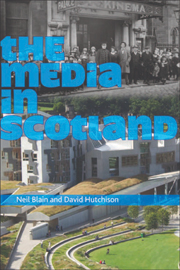Book contents
- Frontmatter
- Contents
- Preface
- Framing the Discussion
- 1 A Cause Still Unwon: The Struggle to Represent Scotland
- 2 Scots, English and Community Languages in the Scottish Media
- 3 Communications Policy
- The Historical Context
- Screen and Sound
- Themes and Futures
- Select Bibliography
- Notes on Contributors
- Index
2 - Scots, English and Community Languages in the Scottish Media
from Framing the Discussion
Published online by Cambridge University Press: 05 August 2013
- Frontmatter
- Contents
- Preface
- Framing the Discussion
- 1 A Cause Still Unwon: The Struggle to Represent Scotland
- 2 Scots, English and Community Languages in the Scottish Media
- 3 Communications Policy
- The Historical Context
- Screen and Sound
- Themes and Futures
- Select Bibliography
- Notes on Contributors
- Index
Summary
The story of Gaelic in the modern Scottish media can be presented as the coherent narrative of a relatively successful campaign to win acknowledgement and support, from the ‘condescending paternalism’ of the BBC Handbooks to the Gaelic Language Act of 2005 (Cormack, this volume). The story of Scotland's other languages in the media is a less coherent one, complicated as it is by a number of factors. As the majority language of contemporary Scotland, English requires neither definition nor legal support; its nature, status and role are taken for granted. Scots, if taken as the general term for a set of language varieties that are, given goodwill, mutually intelligible with English, is not so easily presented as a single, distinctive language whose users are entitled to linguistic rights. Its presence in the media is diffuse and ranges from ‘broad Scots’, that is, densely textured regional or social varieties served up in drama or light entertainment, to the token phrase and mock Caledonian accents adopted by transatlantic imports such as Star Trek's, ‘Scotty’ and The Simpsons' ‘Groundskeeper Willie’. Although they are more easily defined than Scots, community languages such as Urdu, Chinese, and increasingly Polish have weaker claims to being historical factors in the construction of a Scottish identity, and the presence of these languages is often seen less as a resource to be nurtured than as simply a communicative obstacle to be overcome (Herrington and Kendall 2005). This chapter can only, then, offer a sketch of the complex relationship of Scots and English in the modern Scottish media, and touch fleetingly on the rise in provision for speakers of community languages.
- Type
- Chapter
- Information
- The Media in Scotland , pp. 20 - 34Publisher: Edinburgh University PressPrint publication year: 2008



